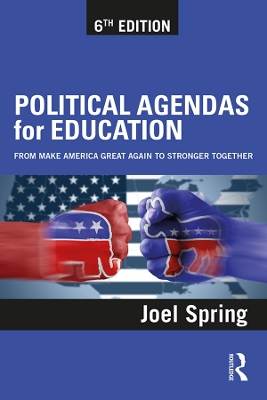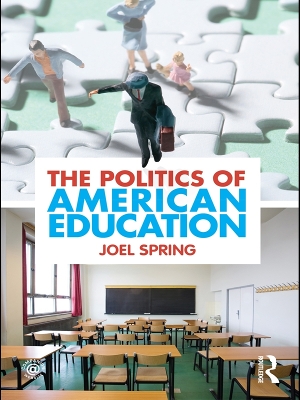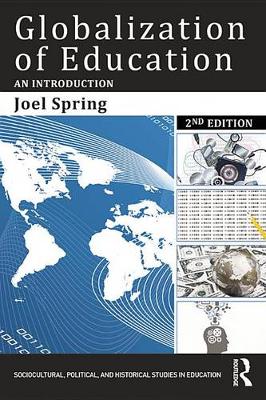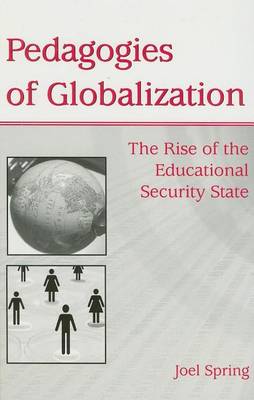Sociocultural, Political, and Historical Studies in Educatio
9 total works
Following the epic, contentious 2016 presidential election, Joel Spring’s ongoing documentation and analysis of political agendas for education reflect the major political issues since 2012. Here he examines the 2016 education planks of the Republican, Democratic, Libertarian, and Green Parties, using their official platforms and other statements, speeches given by each candidate, and media reports and publications. Each party’s position is linked to previous political movements in education. Spring offers an alternative agenda for American schools, including a proposed education amendment to the U.S. Constitution and replacing human capital agendas with goals emphasizing education for a long life and happiness. Taking a fresh look at the social and political forces, educational research, and ideologies shaping their educational agendas and a comparative approach, the book stimulates reflection and discussion.
Updates and changes in the Sixth Edition:
- Betsy DeVos’s education agenda supporting vouchers, free market competition and for-profit schools and its relationship to the education section of the 2016 Republican platform
- The important role religion and culture played in the evolution of Republican education policies after the school prayer and Bible decisions of the 1960s
- The influence of human capital economics on Democratic education proposals
- How No Child Left Behind and Democratic President Barack Obama opened doors to the growth of the for-profit education industry and investment bankers
- The 2016 Democratic positions on the cost of higher education and student loan debts
- The Democratic left as represented by the 2016 campaign of Democrat Bernie Sanders and his influence on the presidential candidate Hillary Clinton and the Democratic Party platform
- The education proposals of the Green and Libertarian parties
Globalization of Education. Sociocultural, Political and Historical Studies in Education Series.
by Joel Spring
Great American Educational-Industrial Complex, The: Ideology, Technology, and Profit
by Anthony G. Picciano and Joel Spring
Turning his distinctive analytical lens to the politics of American education, Joel Spring looks at contemporary educational policy issues from theoretical, practical, and historical perspectives. This comprehensive overview documents and explains who influences educational policy and how, bringing to life the realities of schooling in the 21st century and revealing the ongoing ideological struggles at play. Coverage includes the influence of global organizations on American school policies and the impact of emerging open source and other forms of electronic textbooks.
Thought-provoking, lucid, original in its conceptual framework and rich with engaging examples from the real world, this text is timely and useful for understanding the big picture and the micro-level intricacies of the multiple forces at work in controlling U.S. public schools . It is the text of choice for any course that covers or addresses the politics of American education.
Companion Website: The interactive Companion Website accompanying this text includes relevant data, public domain documents, YouTube links, and links to websites representing political organizations and interest groups involved in education.
Educating the Consumer-Citizen: A History of the Marriage of Schools, Advertising, and Media
by Joel Spring
Continuing Joel Spring's reportage and analysis of the intersection of global forces and education, this text offers a comprehensive overview and synthesis of current research, theories, and models related to the topic. Written in his signature clear, narrative style, Spring introduces the processes, institutions, and forces by which schooling has been globalized and examines the impact of these forces on schooling in local contexts. Significant conceptual frameworks are added to this Second Edition, specifically the "economization of education," "corporatization of education" and the "audit state." These concepts are embedded in the global educational plans of major organizations such as the World Bank, the Organization for Economic Development and Cooperation (OECD), World Economic Forum, and multinational corporations.
Globalization of Education, Second Edition features new and updated information on
* The World Bank
* OECD and the United Nations
* The World Trade Organization and the Global Culture of Higher Education
* Corporatization of Global Education
* Religious and Indigenous Education Models
* The Global Workforce: Migration and the Talent Auction
* Globalization and Complex Thought
Education Networks: Power, Wealth, Cyberspace, and the Digital Mind
by Joel Spring
Education Networks is a critical analysis of the emerging intersection among the global power elite, information and communication technology, and schools. Joel Spring documents and examines the economic and political interests and forces -including elite networks, the for-profit education industry, data managers, and professional educators - that are pushing the use of ICT for online instruction, test preparation and tutoring, data management, instructional software packages, and more , and looks closely at the impact this is having on schools, students, and learning.
Making a distinction between "mind" (as socially constructed) and "brain" (as a physiological entity), Spring draws on recent findings from comparative psychology on the possible effects of ICT on the social construction of the minds of students and school managers, and from neuroscience regarding its effect on students' brains. Throughout, the influence of elite networks and powerful interest groups is linked to what is happening to children in classrooms. In conclusion Spring offers bold suggestions to change the course of the looming technological triumph of ICT in the "brave new world" of schooling.
Political Agendas for Education: From the Christian Coalition to the Green Party
by Joel Spring





